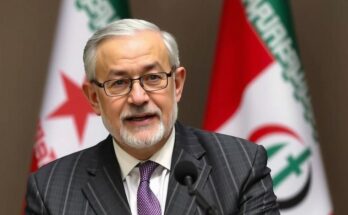Israeli Prime Minister Benjamin Netanyahu has escalated operations against Hezbollah, defying U.S. diplomatic attempts to prevent a broader conflict. Israeli raids into southern Lebanon are seen as preparations for a potential ground invasion, despite U.S. warnings. Critics argue that continued U.S. military support allows Netanyahu to disregard calls for restraint, raising concerns about regional stability.
Israeli Prime Minister Benjamin Netanyahu has significantly intensified military operations against Hezbollah, defying diplomatic attempts by the United States to prevent a broader conflict in the region. Reports indicate that Israeli commandos have engaged in raids across southern Lebanon, which align with conjectures of an impending ground invasion. This aggressive military posture follows a remarkable series of airstrikes in Lebanon, including the recent targeted killing of a Hamas leader and an unprecedented strike in central Beirut, marking the first of its kind since 2006. Amir Avivi, a retired senior military official, stated, “The IDF has made a lot of preparations for a ground incursion. Overall, this always includes special operations. This is part of the process.” The escalation is set against the backdrop of the assassination of Hezbollah’s leader, Hassan Nasrallah, which has elevated tensions considerably within the ongoing conflict that has seen extensive Israeli military actions since the October 7 terrorist attacks. President Joe Biden’s administration has been keenly focused on averting an expanded war scenario that could involve the U.S. and its regional allies. However, critiques of the Biden administration’s strategy suggest that the transfer of U.S. military aid has inadvertently facilitated Israel’s aggressive tactics. Professor Gilbert Achcar remarked, “Without U.S. support, this war would not have been possible. It is actually the joint U.S.-Israeli war.” Despite the U.S. urging restraint, Biden’s significant military assistance appears to embolden Netanyahu’s policies, as former Pentagon advisor Jazmine El-Galal noted, “It’s that Biden is not actually trying seriously to effect any change. He’s been complaining about Netanyahu for almost a year now, but in the meantime, the U.S. continues to send arms and funds to Israel.” The recent turbulence saw a spike in military operations just as U.S. officials were on the cusp of brokering a ceasefire agreement. Reacting to the sudden strikes, one U.S. official expressed shock that Israel conducted such operations without prior notification to its key ally, declaring, “We are shocked” in response to Netanyahu’s dismissal of the ceasefire proposal. Furthermore, General Lord Richard Dannatt pointed out that Netanyahu feels optimistic about the conflict’s trajectory, stating that he believes he can “press on” with the war. The ongoing U.S. arms supply continues to aggravate the situation, with the administration criticized for not taking effective measures to restrain Israeli aggression, particularly considering that the country is the largest recipient of military assistance from the U.S. Since the onset of the current conflict, the U.S. has committed at least $12.5 billion in military aid to Israel, thereby significantly influencing the warfare dynamics. Critics, such as Sarah Leah Whitson, have underscored the importance of holding Israel accountable, arguing that failing to do so undermines the international rules-based order. Meanwhile, National Security Advisor Jake Sullivan refuted claims that Biden has given up on diplomacy, stating, “No, he absolutely hasn’t given up.” Amidst the potential risk for a wider conflict, Sec. of State Antony Blinken cautioned that continued military actions could lead to lasting instability, stating, “The choices that all parties make in coming days will determine which path this region is on with profound consequences for its people now and possibly for years to come.”
The heightened tensions between Israel and Hezbollah have developed against the backdrop of longstanding animosities in the Middle East, exacerbated by Iran’s support for militia groups in the region, including Hamas and Hezbollah. Following a resurgence of hostilities that began with the October 7 attacks, Israel has undertaken a series of retaliatory measures aimed at dismantling groups it views as terrorist threats. The U.S. has traditionally been a key ally of Israel, providing military support to help maintain its security. However, the current escalation poses a dilemma for U.S. diplomacy, as it seeks to balance support for Israel while averting wider regional conflict.
The intensifying military operations led by Israel against Hezbollah underscore a deliberate defiance of U.S. efforts to broker peace and mitigate the risk of an expanded conflict. As Netanyahu escalates these operations amidst significant U.S. military support, it raises critical questions regarding the effectiveness of American diplomacy and its impact on regional stability. Assertive responses from U.S. officials suggest an urgent need for more effective strategies to navigate this increasingly precarious situation as a wider war beckons.
Original Source: www.businessinsider.com




